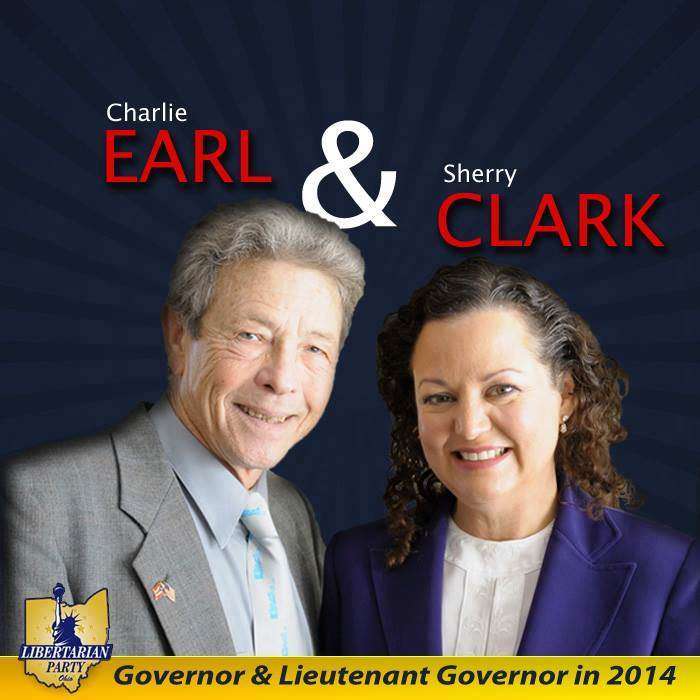Judge Says Ohio GOP Orchestrated Plot Against Libertarian Party Candidate

A ruling from a District Court in Ohio significantly diminishes the chances of getting a Libertarian Party candidate on the ballot for the 2014 governor's race. Interestingly, however, District Judge Michael H. Watson found it credible that both of the state's ruling parties had a hand in either propping up or bringing down Libertarian gubernatorial candidate Charlie Earl. In his decision, Watson wrote that it was "obvious" that the "dupe" who challenged Earl's petitions had been used by "operatives or supporters of the Ohio Republican Party." Unfortunately, that had no bearing on the legal issue at hand.
If Earl gains ballot access, he will run against current Republican Gov. John Kasich and Democrat Ed Fitzgerald in November—a situation which many find likely to work out in Fitzgerald's favor. A situation which seems to have Ohio Democrats working to get Earl on the ballot and Ohio Republicans working to keep him off it.

As of now, he's off: Ohio Secretary of State John Husted ruled in early March that Earl was ineligible due to invalid collection of petition sigantures (for more about the particulars, see my post here yesterday). The Libertarian Party of Ohio (LPO) responded by seeking a stay of Husted's ruling in District Court. District Judge Watson denied the LPO's request late Wednesday.
Requiring petition circulators to either be of the same party as a candidate or disclose their employer places "only a minimal burden on political speech," wrote Watson. Yet the disclosures "are substantially related to Ohio's significant interest in deterring and detecting fraud in the candidate petition process."
Though Judge Watson found Earl's dismissal from the ballot legally sound, he didn't buy that the state GOP had nothing to do with it. Confirming what LPO Communication Director Aaron Harris told me about Gregory Felsoci, the "clueless" Akron man challenging Earl's petition, Judge Watson called him a "guileless dupe" whose testimony showed he had no idea what he was doing.
"His testimony demonstrates that he lacks even a basic understanding of the nature of the protest he agreed to sign. Felsoci repeatedly referred to the misdeed that motivated him to protest (Earl's) petitions as the LPO's gathering of "votes" without disclosing those who gathered them were being paid to do so. His decision to act as a protester came about after a Republican friend, John Musca, showed him an unidentified document which Musca claimed to have found at a local coffee shop. Felsoci could not as much as accurately describe the nature of the document Musca showed him and was at an utter loss to explain why he believed the truth of the assertions the document contained. He said he believed it because he read it."
Judge Watson also noted that "the Ohio Democratic Party, or its operatives or supporters, provided assistance to (the LPO) in their efforts to gather petition signatures."
The LPO is making an emergency appeal to the Sixth Circuit Court of Appeals for the temporary injunction. "While we respect Judge Watson's decision to deny our request for a temporary restraining order against Husted's decision, we feel that he may be wrong in this instance," said LPO attorney Mark Brown in a statement.
Earl himself, however, has a different (and kind of awesome) take on it. From The Columbus Dispatch:
"On the common sense issues I think we should have won," Earl said tonight. "But, in another sense as a Libertarian, I would rather have the judge strictly follow the law now and forever more so we know exactly what the playing field is going on."
The LPO is pursing a separate case concerning Libertarian attorney general candidate Steve Linnabary, whose petitions were also disqualified by the Secretary of State. The LPO is challenging the judgement in the Ohio Supreme Court on the grounds that the person who filed the protest to Linnabary's petition was not a member of the Libertarian Party, as required.
Editor's Note: As of February 29, 2024, commenting privileges on reason.com posts are limited to Reason Plus subscribers. Past commenters are grandfathered in for a temporary period. Subscribe here to preserve your ability to comment. Your Reason Plus subscription also gives you an ad-free version of reason.com, along with full access to the digital edition and archives of Reason magazine. We request that comments be civil and on-topic. We do not moderate or assume any responsibility for comments, which are owned by the readers who post them. Comments do not represent the views of reason.com or Reason Foundation. We reserve the right to delete any comment and ban commenters for any reason at any time. Comments may only be edited within 5 minutes of posting. Report abuses.
Please to post comments


The Ohio GOP is full retard on this subject, and I say that as someone who doesn't mind the current administration and thinks that Kasich et. al. have been a positive influence on the State.
They have absolutely nothing to fear from the LP here, and this just shows them as short-sighted, mendacious twats.
The Republican party as short-sighted, mendacious twats? Stop the presses! That certainly has never happened before. They're usually stupid, short-sighted, mendacious twats.
Fuck Kasich.
Hey, that $400 million he promised the state would "save" from the Medicaid expansion he pushed?
Yeah. They admitted yesterday that that ain't happenin'.
Fuck Kasich hard.
Payback would be running a candidate in the GOP primary saying truly outrageous things about minorities, commie infiltrators, gays, women and rapists, etc. Embarrass the crap out of the GOP until they stop the assault on third party petitions.
They don't need any outside help with that.
It'd be one thing if the Ohio GOP had a significant Paulian wing. It doesn't. Nothing there but bible-thumpers and corporate humpers.
No, the rights of voters mean *voters* not majir parties get to decide which third parties to support, even if every Ohio Republican was a Rand Paul clone.
"corporate humpers"
The IL GOP Establishment! ...oh, wait, you were talking about Ohio, right?
You think they'd be happy to let the libertarian steam channel off through the LP. But, you know, if they really want us to take over their fucking party, I'm willing to give it a shot.
Why can't the Reps take all the energy they use to deny ballot access to the LP and use that energy to support left wing third parties, if they're worried about their votes being "stolen"? Help the Greens "steal" votes from Dems, to balance out the LP's effect? But that wouldn't encourage their authority boner, would it?
Liz has forgotten how to do alt-text.
I know I may be late to a party here, but "Ballot access"... why does the government grant or deny ANYONE "ballot access"?
Rhymes with "large pizza pie."
Fuck you...that's...why? Marge spits in my eye? I'm drawin' blanks here... help a brother out.
Yeah, that first thing you said.
Unless you know someone named Marge who's mad at you.